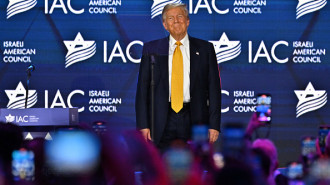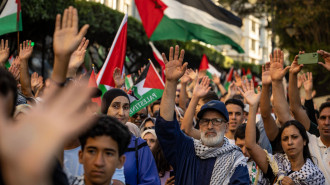Iraq's displaced forgotten in elections
While the election campaign is in full swing elsewhere in Iraq, the country's displaced camps holding hundreds of thousands of people barely register on the radars of those running for office.
In "Camp Seven" in the western Anbar province not a single campaign poster can be seen appealing to those who have the right to cast their ballot at the parliamentary vote on 12 May.
The rows of UN tents are part of nine sprawling encampments in the region housing thousands of people who fled the devastating fight against the Islamic State group.
Some five months after the Iraqi government declared victory over the militants they remain stuck in the desert camp - and apparently ignored by the country's politicians.
For many of the residents the disinterest shown by the election candidates is mirrored by their own antipathy to those running.
"I have no confidence in them," says Umm Maher, who fled her home in Qaim, a former IS-stronghold.
 |
In 'Camp Seven' in the western Anbar province not a single campaign poster can be seen appealing to those who have the right to cast their ballot at the parliamentary vote on 12 May |
 |
Heightening her anger - and that of others here - is the destruction of their homes and the disappearance of male relatives they say were either killed or seized by security services during the battle against IS.
"If they want our votes, they can give us back our children and our homes," adds the 50-year old, who doesn't know the fate of her husband and son.
Going into the polls, Iraq is only just starting to recover from the years of IS dominance over swathes of the country and the punishing fight to end it.
Twitter Post
|
Out of a total displaced population of around two million people, some 285,000 are registered to vote, according to the electoral commission.
Some 166 polling stations are being installed in 70 displaced camps, spread across eight of the country's 18 provinces.
'Nobody has come'
In a bid to encourage the displaced to vote, election officials say identification requirements have been eased for those in the camps.
But despite that, Umm Maher is not the only female resident of Camp Seven who won't be voting, due to the scar left behind by the violence.
"I will not vote until my eldest son returns," says 47-year-old Umm Ahmed, who hasn't seen her 20-year-old child since he was seized three years ago.
"Besides, nobody has come to ask after us," adds the former resident of Saqlawiya, another ex-IS stronghold, a black veil partially covering her face.
Politicians admit that despite the potential votes that could be won in the camps, few have ventured there.
 |
Some 166 polling stations are being installed in 70 displaced camps, spread across eight of the country's 18 provinces |  |
"The campaign is absent in the camps and no candidate goes there, even though the votes of the displaced are important," confirms Hikmat Zeydan, from the Rally for the Unity of Iraq, fielding five candidates in Anbar.
Many "are afraid of finding themselves in a difficult situation, because they have done nothing to help the return of the displaced".
One candidate, running on a list for Prime Minister Haider al-Abadi's Shia-dominated Victory Alliance in Samarra, north of Baghdad is blunt in explaining why he has stayed away from two nearby camps.
"We have not put up any posters and did not move (around there) because most families are Daesh," alleges Jassem al-Joubouri, using an Arabic term for IS.
Elsewhere in the country some have made an effort at trying to represent the interests of the displaced.
Abdel Bari Abbas, fled his home west of the former IS bastion of Mosul, and is now standing as a candidate.
As he runs his campaign from Baharka camp, in Arbil province in Kurdistan, he insists his experiences give him a unique insight into how to help.
"My family and the majority of Mosul residents have had many struggles. It is necessary to have a candidate who will make their voices heard," says the 48-year-old Arabic teacher.
"The problems will not be solved without us and I promised myself that even if I am elected, my family and I will stay in the camp."

![Palestinians mourned the victims of an Israeli strike on Deir al-Balah [Getty]](/sites/default/files/styles/image_684x385/public/2024-11/GettyImages-2182362043.jpg?h=199d8c1f&itok=xSHZFbmc)


![The law could be enforced against teachers without prior notice [Getty]](/sites/default/files/styles/image_684x385/public/2178740715.jpeg?h=a5f2f23a&itok=hnqrCS4x)
 Follow the Middle East's top stories in English at The New Arab on Google News
Follow the Middle East's top stories in English at The New Arab on Google News


